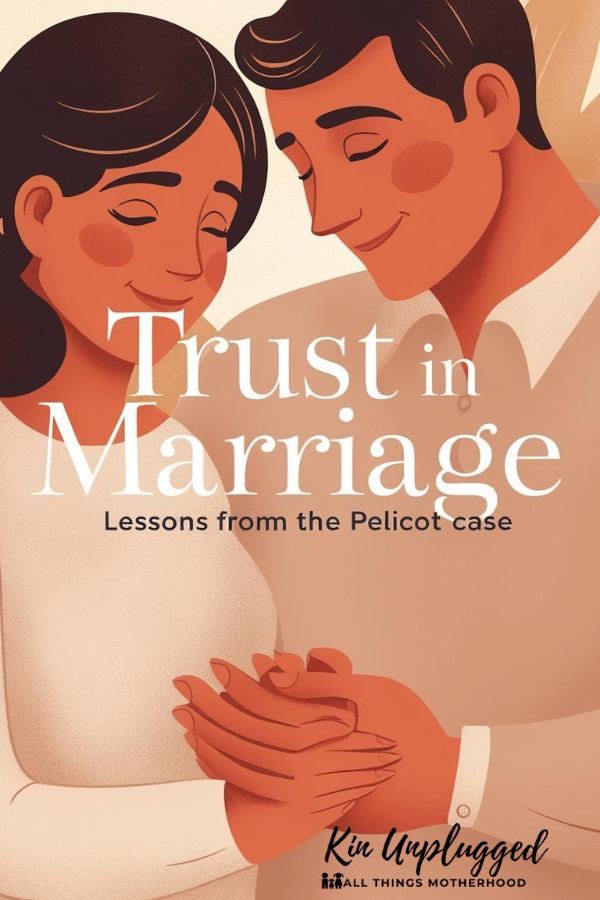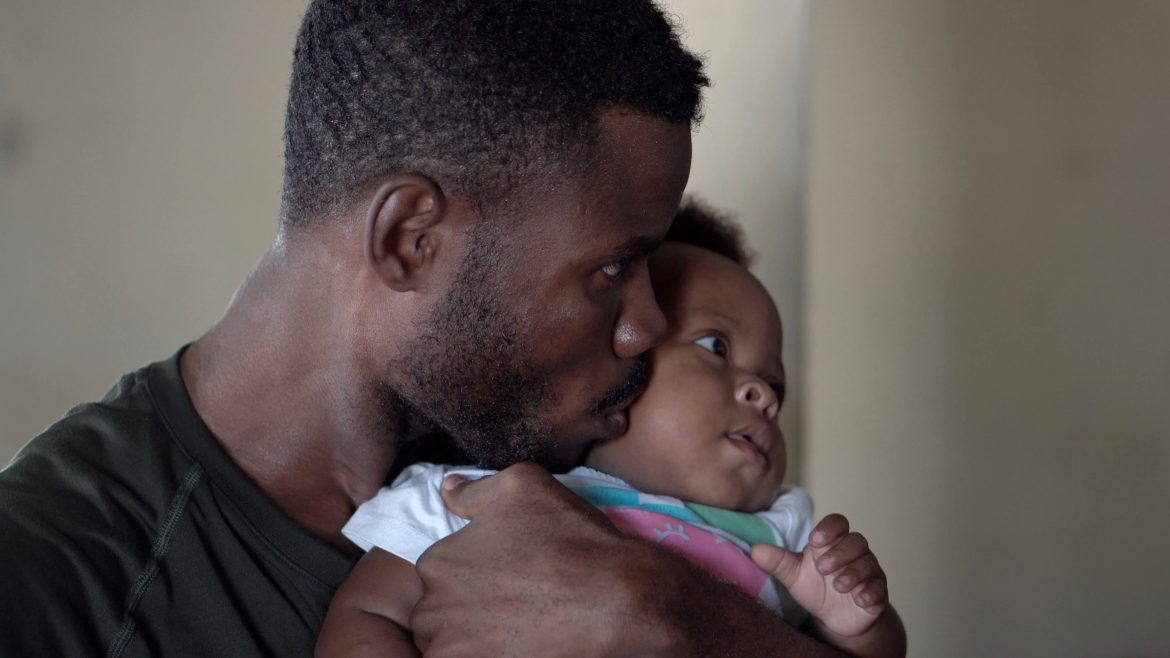I would love for this to be a safe space from the full details of the Pelicot case that I’m certain badly triggers many people who come across it. For that reason, I won’t go into direct details about it here.
However, if you don’t know anything about the case, feel free to read up on it HERE before you carry on reading this article. Just be warned that you might need to steel yourself for horrible details of abuse of the sexual kind.
With that said, I believe it is important to glean as many lessons from horrific events as possible. In this situation, there are quite a few things that moms (and parents in general) can learn and pass down to their kids.
The Pelicot case has some truly profound lessons for moms, families and society about consent, trust and safeguarding. It emphasizes the importance of vigilance, open communication and the responsibility to educate children about healthy boundaries and personal safety.
4 Major lessons for Moms and families

1. Awareness of red flags in relationships
Trust can be manipulated. Even within intimate relationships, it’s crucial to recognize and address signs of control, secrecy or abusive behavior.
Families must create an environment where everyone feels safe sharing concerns or suspicions.
2. The Importance of speaking out
Gisèle Pelicot’s courage in coming forward shows the strength it takes to break the silence on abuse. This highlights the importance of empowering survivors to seek help without fear of judgment.
Families must create a supportive atmosphere where victims feel safe to speak up.
3. Understanding consent
The case exposes a stark violation of consent. Families should have open conversations about what consent truly means, emphasizing that it must be freely given, informed and ongoing.
Teach children that consent is non-negotiable, even in relationships of trust.
4. The role of community support
Gisèle’s case reminds us of the power of community solidarity. Families must learn to stand by survivors, challenge victim-blaming and demand accountability from perpetrators.
What moms should teach their kids

1. Body autonomy and respect
Teach kids from an early age that their bodies belong to them and that no one has the right to touch or harm them without permission.
Encourage them to respect others’ boundaries as well.
2. The importance of communication
Encourage open discussions about feelings, relationships and safety.
Teach them to trust their instincts and share concerns with trusted adults.
3. Recognizing abuse and seeking help
Equip kids with the knowledge to recognize inappropriate behavior, even from someone they trust and encourage them to report it without fear.
Teach that seeking help is a sign of strength not weakness.
4. Accountability in relationships
Model and teach children the importance of accountability, empathy and equality in all relationships.
Encourage them to question manipulative or controlling behavior and seek healthy dynamics.
Moms and families must encourage open communication, prioritize education on consent and boundaries and build resilience in children to protect them from exploitation. The Pelicot case serves as a sobering reminder that vigilance, empowerment and mutual respect are major keys to safeguarding loved ones.
7 Lessons for wives
The Pelicot case offers specific lessons for wives that extend beyond general insights into safety and relationships. These lessons focus on vigilance, empowerment and encouraging personal autonomy within intimate partnerships.

1. Trust, but verify
Blind trust can be exploited. While trust is essential in any marriage, it’s also important to remain aware of potential red flags, no matter how unlikely they seem.
Pay attention to subtle changes in behavior, secrecy or unusual patterns in your partner’s actions. It doesn’t mean mistrusting your spouse but being mindful of anything that feels off.
2. Maintain financial and personal independence
Control through dependency. Abusers often use financial or emotional dependency as a means of control. Dominique’s ability to orchestrate this for years highlights how victims can feel trapped in their circumstances.
Make sure you have access to your own finances, personal resources and a network of support outside the marriage.
We’ll talk about that a bit more below.
3. Advocate for your autonomy
Your body, your boundaries. The case really shows the importance of asserting boundaries even in a marital relationship. Marriage never implies a waiver of bodily autonomy or consent.
Communicate your expectations about privacy, respect and consent early and often in your marriage.
4. Be mindful of isolation
Social circles and support matter. Perpetrators often isolate their partners from friends, family, or other support systems, making it easier to conceal abuse.
Stay connected to your social circle and make time for relationships outside your marriage. Having a support network increases your ability to notice or address red flags.
5. Keep track of your health and awareness
Drugging as a tactic. Dominique’s use of drugs to incapacitate Gisèle highlights a risk many don’t consider in intimate relationships.
Be mindful of unexplained physical symptoms, memory gaps or unusual health issues, particularly if they occur repeatedly.
6. Prioritize self-education
Knowledge is empowerment. Understanding the dynamics of abuse, consent, and manipulation can make it easier to recognize subtle signs.
Take time to educate yourself about healthy relationships, abusive dynamics, and your rights, even if everything seems fine.
7. Know when to get help
You don’t have to figure it out alone. Many victims fail to recognize abuse because they believe it’s a personal or private issue.
If something feels wrong, consult a trusted friend, family member, therapist or hotline. Even small doubts are worth investigating.
You know…
The Pelicot case is a painful reminder that abuse can happen even in the most trusted relationships. For wives, it emphasizes the importance of vigilance, self-empowerment and maintaining a strong sense of autonomy, even within loving partnerships. Trust and respect are cornerstones of marriage but protecting yourself (physically, emotionally and financially) is just as critical.
Now on the matter of financial protection…
Financial and personal independence
In my opinion, this is always easier said than done. Maintaining financial and personal independence especially in marriages where traditional roles, economic challenges or emotional dynamics make it difficult. But even in challenging circumstances, there are small, actionable steps wives can take to start building independence.
Here’s a breakdown of how to approach it realistically:
6 Practical steps for achieving independence

1. Build financial awareness
Know your household finances. Even if you’re not the primary earner, stay informed about your family’s income, expenses, savings and debts. Ask to be involved in budgeting and financial planning.
Knowledge is power. Knowing your financial situation ensures you’re not left in the dark if something goes wrong.
2. Start small with personal savings
Open a separate account. If possible, set up a small personal savings account, even if you’re only able to contribute a little at a time.
Automate savings. If you’re earning, automate a small percentage of your income to go into this account without anyone else managing it.
Having your own funds creates a safety net for emergencies or decisions requiring autonomy.
3. Cultivate a marketable skill
Leverage free resources. Use free or affordable online platforms (e.g., YouTube, Coursera, Udemy) to learn or improve a skill, whether it’s digital marketing, writing or even starting a small business.
Pursue part-time work or side hustles. If working full-time isn’t possible, consider freelance opportunities, consulting or creating a product or service you can sell.
Building skills and creating an income source, no matter how small, gives you confidence and options.
4. Stay connected to support networks
Talk to other women. Surround yourself with supportive friends or family members who value independence and can encourage you.
Online or local groups (e.g., parenting networks, women’s support groups) can provide emotional support and practical advice.
Isolation makes it harder to see alternatives. A strong network can inspire action and offer guidance.
5. Establish legal safeguards
Research marital property laws, inheritance rights and other legal protections in your country.
Keep copies of essential documents (e.g., IDs, marriage certificates, financial records) in a secure but accessible place.
In abusive or controlling situations, having legal and financial knowledge can make all the difference.
6. Prioritize personal growth
Set personal goals. Whether it’s pursuing education, learning a hobby, or taking time for self-reflection, focus on activities that enrich your individuality.
Independence starts with mindset. Pushing for your sense of self outside of the marriage creates self-confidence and resilience.
Let’s acknowledge the challenges though…
It’s true that:
- In some cultures, the expectation for women to be dependent on their husbands is deeply ingrained.
- Financial constraints, childcare and time make it harder to pursue independence.
- Emotional dependency. The emotional weight of a long-term relationship can make taking steps toward autonomy feel like betrayal.
The path forward
Start small and focus on incremental changes. Independence doesn’t mean rejecting your partner. It means safeguarding yourself for your own well-being and the good of your family.
Even small actions, like educating yourself about your finances or developing a skill, can empower you over time.
The Pelicot case raises profoundly unsettling questions about trust and intimacy in marriage, particularly the idea that you might never fully know the person you are married to. It challenges traditional notions of partnership and highlights the delicate balance between trust and self-protection.
Lessons on the importance of trust in a marriage

1. Trust as a foundation, but not blind faith
Marriage thrives on trust but blind trust without checks can be dangerous. Dominique Pelicot exploited his wife’s trust to commit unspeakable acts while maintaining a façade of normalcy.
Trust should be built on consistent transparency and mutual respect, not assumed or taken for granted. While love often means vulnerability, it’s important to maintain personal boundaries and awareness.
READ: How to cope with an angry husband (8 Effective Strategies)
2. Trust requires vigilance and communication
Open, honest communication is essential. Gisèle Pelicot’s case highlights how manipulation and secrecy can thrive in silence.
Create an environment where both partners can question behaviors or decisions without fear of judgment or reprisal. Healthy trust grows in an atmosphere of mutual accountability.
3. Trust must Be Verified with Actions
Dominique’s dual life went undetected for years because his words and surface behavior didn’t match his hidden actions.
Observe whether a partner’s actions consistently align with their words. Trust is not only given but earned through behavior over time.
The Issue of possibly never truly knowing your Spouse

1. People can hide dark secrets
Dominique’s case reveals how someone can maintain a hidden life for years. This isn’t just about deception. It’s about the human capacity for compartmentalization and manipulation.
Accept that even in the closest relationships, there may always be parts of your partner’s mind or life that remain unknown to you. This doesn’t mean mistrust but it does highlight the importance of self-awareness and caution.
2. Marriages evolve and so do people
Over time, people can change in unexpected ways. Sometimes for the worse. In Gisèle’s case, her husband’s criminal behavior likely escalated over time without her noticing.
Regularly check in on your relationship and partner’s behaviors. Be open to noticing changes, even subtle ones, that could indicate deeper issues.
3. Control vs. autonomy
The idea that you can completely “know” your spouse suggests a degree of control that doesn’t exist in healthy relationships. People have agency and layers that no one, not even a partner, can fully access.
Balance trust with personal autonomy. Your spouse is a partner, not someone you control or monitor constantly.
How to protect yourself while trusting

1. Build a strong personal foundation
Maintain a sense of independence (emotionally, financially and socially) to ensure that your identity isn’t solely tied to your partner.
2. Create open channels for feedback
Encourage honesty and accountability within your relationship by encouraging open conversations about behaviors, habits and concerns.
3. Pay attention to intuition
If something feels off, don’t dismiss your instincts. In many cases, small signs or discomforts can point to deeper issues.
4. Normalize external support
Rely on trusted friends, family or therapists for perspective. A strong support system outside the marriage provides a reality check.
Finally…
The Pelicot case is a stark reminder that while trust is crucial in marriage, it should never come at the expense of your safety, awareness or autonomy. Trusting someone doesn’t mean turning a blind eye to red flags or believing you can completely know another person. It’s about balancing openness and vulnerability with self-protection and ongoing communication.
Healthy marriages are built on mutual respect, honesty and accountability. Not blind faith.





